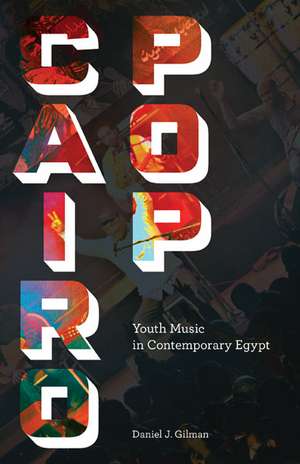Cairo Pop: Youth Music in Contemporary Egypt
Autor Daniel J. Gilmanen Limba Engleză Paperback – noi 2014
Cairo Pop is the first book to examine the dominant popular music of Egypt, shababiyya. Scorned or ignored by scholars and older Egyptians alike, shababiyya plays incessantly in Cairo, even while Egyptian youth joined in mass protests against their government, which eventually helped oust longtime Egyptian president Hosni Mubarak in early 2011. Living in Cairo at the time of the revolution, Daniel Gilman saw, and more importantly heard, the impact that popular music can have on culture and politics. Here he contributes a richly ethnographic analysis of the relationship between mass-mediated popular music, modernity, and nationalism in the Arab world.
Before Cairo Pop, most scholarship on the popular music of Egypt focused on musiqa al-ṭarab. Immensely popular in the 1950s and ’60s and even into the ’70s, musiqa al-ṭarab adheres to Arabic musical theory, with non-Western scales based on tunings of the strings of the ‘ud—the lute that features prominently, nearly ubiquitously, in Arabic music. However, today one in five Egyptians is between the ages of 15 and 24; half the population is under the age of 25. And shababiyya is their music of choice. By speaking informally with dozens of everyday young people in Cairo, Gilman comes to understand shababiyya as more than just a musical genre: sometimes it is for dancing or seduction, other times it propels social activism, at others it is simply sonic junk food.
In addition to providing a clear Egyptian musical history as well as a succinct modern political history of the nation, Cairo Pop elevates the aural and visual aesthetic of shababiyya—and its role in the lives of a nation’s youth.
Before Cairo Pop, most scholarship on the popular music of Egypt focused on musiqa al-ṭarab. Immensely popular in the 1950s and ’60s and even into the ’70s, musiqa al-ṭarab adheres to Arabic musical theory, with non-Western scales based on tunings of the strings of the ‘ud—the lute that features prominently, nearly ubiquitously, in Arabic music. However, today one in five Egyptians is between the ages of 15 and 24; half the population is under the age of 25. And shababiyya is their music of choice. By speaking informally with dozens of everyday young people in Cairo, Gilman comes to understand shababiyya as more than just a musical genre: sometimes it is for dancing or seduction, other times it propels social activism, at others it is simply sonic junk food.
In addition to providing a clear Egyptian musical history as well as a succinct modern political history of the nation, Cairo Pop elevates the aural and visual aesthetic of shababiyya—and its role in the lives of a nation’s youth.
Preț: 125.09 lei
Preț vechi: 170.61 lei
-27% Nou
Puncte Express: 188
Preț estimativ în valută:
23.95€ • 24.63$ • 19.87£
23.95€ • 24.63$ • 19.87£
Carte indisponibilă temporar
Doresc să fiu notificat când acest titlu va fi disponibil:
Se trimite...
Preluare comenzi: 021 569.72.76
Specificații
ISBN-13: 9780816689286
ISBN-10: 0816689288
Pagini: 280
Ilustrații: 15
Dimensiuni: 140 x 216 x 20 mm
Greutate: 0.37 kg
Ediția:1
Editura: University of Minnesota Press
Colecția Univ Of Minnesota Press
ISBN-10: 0816689288
Pagini: 280
Ilustrații: 15
Dimensiuni: 140 x 216 x 20 mm
Greutate: 0.37 kg
Ediția:1
Editura: University of Minnesota Press
Colecția Univ Of Minnesota Press
Notă biografică
Daniel J. Gilman is assistant professor of anthropology at DePauw University.
Cuprins
Contents
Preface
Acknowledgments
Note on Transliteration and Pseudonyms
Introduction: Good Music, Bad Music, and Youth Music
1. “My Patience Is Short”: Youth Talk about Grandpa’s Music
2. “Oh, My Brown-skinned Darling”: Sex, Music, and Egyptian-ness
3. “The Hardest Thing to Say”: Taxonomies of Aesthetics
4. “A Poem Befitting of Her”: Ambiguity and Sincerity in Revolutionary Pop Culture
Epilogue: On the Counter-Revolution
Notes
Glossary
Bibliography
Index
Preface
Acknowledgments
Note on Transliteration and Pseudonyms
Introduction: Good Music, Bad Music, and Youth Music
1. “My Patience Is Short”: Youth Talk about Grandpa’s Music
2. “Oh, My Brown-skinned Darling”: Sex, Music, and Egyptian-ness
3. “The Hardest Thing to Say”: Taxonomies of Aesthetics
4. “A Poem Befitting of Her”: Ambiguity and Sincerity in Revolutionary Pop Culture
Epilogue: On the Counter-Revolution
Notes
Glossary
Bibliography
Index
Recenzii
"Ignored by scholars and disdained by the local intelligentsia as fluff, Egyptian pop (shababiyya) videos are streamed nonstop on local satellite television and loved by millions throughout the Middle East. Daniel J. Gilman’s is the first serious scholarly account of Egyptian pop, and it is a tour de force. Based on interviews with Cairo fans, he manages to convince us of shababiyya’s significance, explain its position in the music hierarchy, and explain why young listeners so appreciate its ‘sincerity’ and its modernity. An essential read." —Ted Swedenburg, University of Arkansas
"An erudite examination of the interplay among pop culture, society and national identity."—George de Stefano, Pop Matters
"Gilman succeeds in taking on a huge task, parsing out at an exceptional level the relationships found between a variety of musical styles and their fan bases. Indeed, by querying “What is Egyptian music?” he is in truth raising a far greater question, namely: “What is Egypt?” (p. 127)."—Middle East Media and Book Reviews Online
"This book’s timeliness and relevance to contemporary Egyptian social and political forces make it an essential read for anthropologists, folklorists, and ethnomusicologists interested in the contemporary Middle East."—Ethnomusicology
"Gilman succeeds in taking on a huge task, parsing out at an exceptional level the relationships found between a variety of musical styles and their fan bases. Indeed, by querying “What is Egyptian music?” he is in truth raising a far greater question, namely: “What is Egypt?” (p. 127)."—Middle East Media and Book Reviews Online
"This book’s timeliness and relevance to contemporary Egyptian social and political forces make it an essential read for anthropologists, folklorists, and ethnomusicologists interested in the contemporary Middle East."—Ethnomusicology
